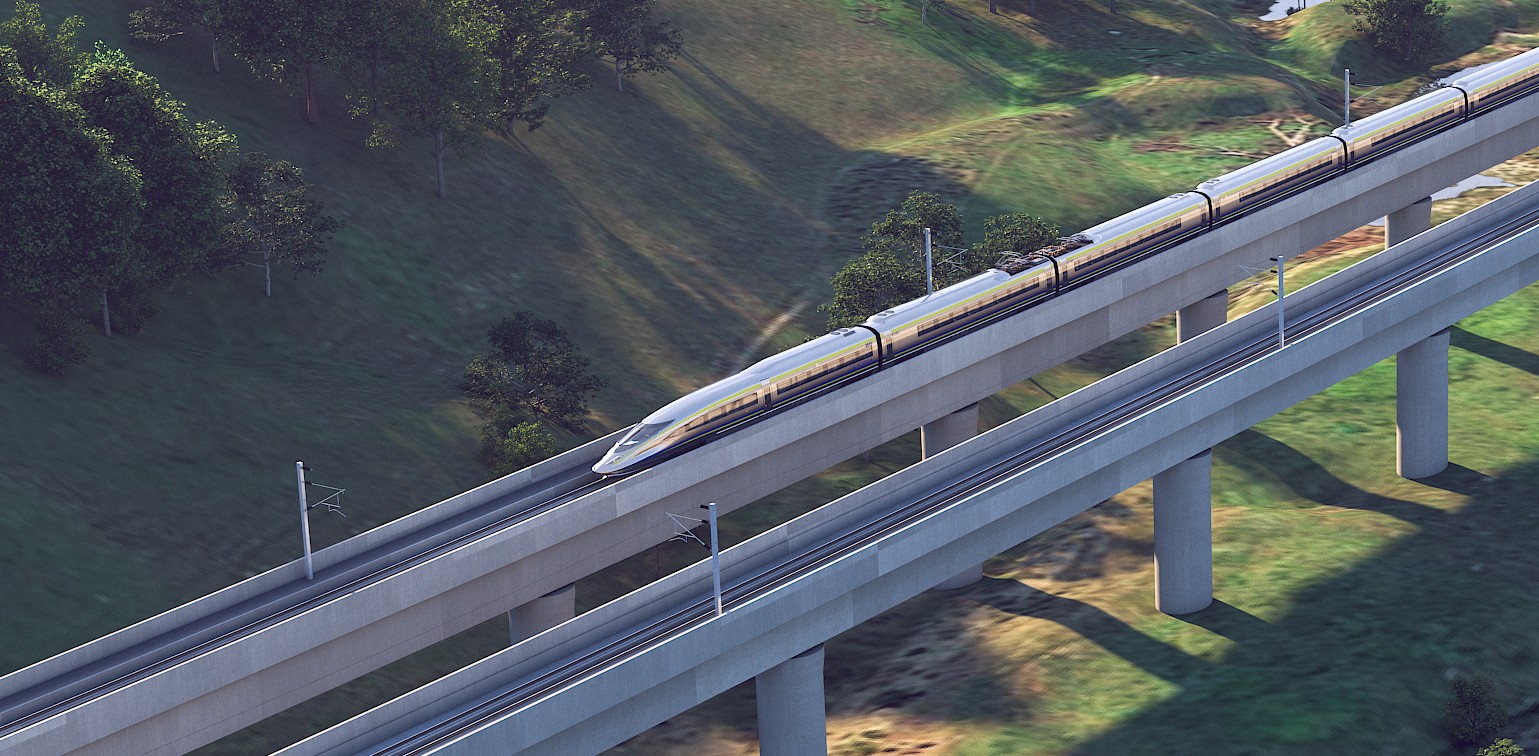درباره من
پیوندها
- انجمن زلزله ایران
- سازمان نقشه برداری کشور
- وزارت راه و شهرسازی
- مرکز تحقیقات ساختمان و مسکن
- پژوهشگاه زلزله
- معاونت برنامه ریزی و نظارت راهبردی رئیس جمهور
- آخرین زمین لرزه ها
- دانشگاه آزاد قزوین
- باشگاه پژوهشگران جوان و نخبگان
- American Concrete Institute: ACI
- American Society of Civil Engineers
- انجمن بتن ایران ICI
- انجمن سازه های فولادی ایران
- U.S. Geological Survey
- نظام مهندسی ساختمان استان قزوین
- کانون فارغ التحصیلان دانشگاه آزاد
- مرکز تحقیقات صنعت ساختمان و بتن دانشگاه آزاد قزوین
- قیمت روز مصالح ساختمانی
- سایت جامع اطلاع رسانی قیمت آهن آلات
- دفتر امور مقررات ملّی ساختمان
- سامانه عملیات الکترونیکی مالیاتی
- خبرگزاری مجلس شورای اسلامی
- سازمان هواشناسی
- نظام فنی و اجرایی کشور
- شرکت فنی و مهندسی برنا آوند سازه
- Maps of World
- شرکت تعاونی مسکن فاتحان فجر
- Center forEngineering Strong Motion Data
- Southern California Earthquake Data Center (SCECDC
- Northern California Earthquake Data Center
- مرکز لرزه نگاری ژاپن
- Kajima Builidng and Design Group
- NEHRP- New Building
- Geospatial Information Authority of Japan (GSI)
- Incorporated Research Institutions for Seismology
- Alamut sightseeing tour
برگهها
- Advanced engineering mathematical(ریاضی مهندسی )
- Reasearch Method
- What's the meaning of earthquak
- seismic design handbook .f. naim(کتاب کامل طراحی لرزه ای دکتر فرزاد نعیم)
- Civil Engineering Formulas Pocket Guide
- Dynamics of structures(دینامیک سازه چوپرا-کلاف)
- Principles of SOIL DYNAMICS(دینامیک خاک داس)
- Guideline for Seismic Hazard Analysis(نشریه 626)
- AN OVERVIEW OF SELECTED SEISMIC HAZARD ANALYSIS METHODOLOGIES(مقاله گرین-هال)
- Propagation of Love waves in an elastic layer with void pores
- Seismic Rehabilitation Guidelines(نشریه 360-364)
- (نشریه 038-041)Guiedline for Special structures analysis
- اصول مهندسی زلزله و باد
- آشنایی با زلزله و اثر آن بر سازه
- ETABS
- اصول مدیریت ساخت
جدیدترین یادداشتها
همه- [ بدون عنوان ]
- [ بدون عنوان ]
- [ بدون عنوان ]
- [ بدون عنوان ]
- [ بدون عنوان ]
- [ بدون عنوان ]
- [ بدون عنوان ]
- [ بدون عنوان ]
- [ بدون عنوان ]
- [ بدون عنوان ]
- [ بدون عنوان ]
- [ بدون عنوان ]
- [ بدون عنوان ]
- [ بدون عنوان ]
- [ بدون عنوان ]
- [ بدون عنوان ]
- [ بدون عنوان ]
- [ بدون عنوان ]
- [ بدون عنوان ]
- [ بدون عنوان ]
- [ بدون عنوان ]
- [ بدون عنوان ]
- [ بدون عنوان ]
- [ بدون عنوان ]
- [ بدون عنوان ]
- [ بدون عنوان ]
- [ بدون عنوان ]
- [ بدون عنوان ]
- [ بدون عنوان ]
- قلاب های استاندارد برای میلگردهای طولی و عرضی
- [ بدون عنوان ]
- ارزیابی ملک توسط کارشناس رسمی
- طراحی و اجرای چاهک آسانسور
- مقایسه انواع دیوارهای سبک با یکدیگر
- الزامات فنی برای استفاده از بلوک های سقف پلی استایرن (یونولیت )در سیستم سقف تیرچه - بلوک
- قانون کارشناسان رسمی دادگستری مصوب ۱۳۸۲/۰۲/۱۵
- انواع تخلفات انتظامی کارشناسان رسمی دادگستری
- سامانه پردازش خودکار طیف طراحی سازه ویژه ساختگاه
- متابع مهم دانلود مقالات ، کتاب و پایان نامه ها
- تغییرات ویرایش 99 نسبت به ویرایش 92 مبحث نهم مقررات ملی ساختمان
- دستورالعمل ساخت و ساز در پهنه های گسلی
- محاسبه ضریب تشدید برش دیوارهای سازهای
- جزییات اجرای وال پست ( دفتر ترویج مقررات ملی ساختمان)
- نکات مهم در خرید مسکن
- آموزش کار با GPS
- آموزش جامع نرم افزار Google Earth
- جدول دستورات اتوکد AutoCad
- جوش و انواع آن به همراه کتابچه محاسبات انواع جوش با مثال
- طراحی دال های مشبک ( مجوف) با استفاده از نرم افزارهای ETABS و SAFE
- کتاب " طراحی شمع برای مهندسین سازه و ژئوتکنیک"
بایگانی
- شهریور 1404 1
- مرداد 1404 1
- خرداد 1404 1
- فروردین 1404 1
- بهمن 1403 1
- دی 1403 1
- آذر 1403 1
- آبان 1403 1
- مهر 1403 1
- شهریور 1403 1
- مرداد 1403 1
- خرداد 1403 1
- اردیبهشت 1403 1
- فروردین 1403 1
- اسفند 1402 1
- بهمن 1402 1
- دی 1402 1
- آذر 1402 1
- آبان 1402 1
- مهر 1402 1
- شهریور 1402 1
- مرداد 1402 1
- تیر 1402 1
- خرداد 1402 1
- اردیبهشت 1402 1
- فروردین 1402 1
- اسفند 1401 1
- بهمن 1401 1
- دی 1401 1
- آذر 1401 1
- آبان 1401 1
- مهر 1401 1
- شهریور 1401 1
- مرداد 1401 1
- تیر 1401 1
- خرداد 1401 1
- اردیبهشت 1401 1
- فروردین 1401 1
- اسفند 1400 1
- بهمن 1400 1
- دی 1400 1
- آذر 1400 1
- آبان 1400 1
- مهر 1400 1
- شهریور 1400 1
- مرداد 1400 1
- تیر 1400 1
- خرداد 1400 1
- اردیبهشت 1400 1
- فروردین 1400 1
- اسفند 1399 1
- بهمن 1399 1
- دی 1399 1
- آذر 1399 1
- آبان 1399 1
- مهر 1399 1
- شهریور 1399 1
- مرداد 1399 1
- تیر 1399 1
- خرداد 1399 1
- اردیبهشت 1399 1
- فروردین 1399 1
- اسفند 1398 1
- بهمن 1398 1
- دی 1398 1
- آذر 1398 1
- آبان 1398 1
- مهر 1398 1
- شهریور 1398 1
- مرداد 1398 1
- تیر 1398 1
- خرداد 1398 1
- اردیبهشت 1398 1
- فروردین 1398 1
- اسفند 1397 1
- بهمن 1397 1
- دی 1397 1
- آذر 1397 1
- آبان 1397 1
- مهر 1397 1
- شهریور 1397 1
- مرداد 1397 1
- تیر 1397 1
- خرداد 1397 1
- اردیبهشت 1397 1
- فروردین 1397 1
- اسفند 1396 1
- بهمن 1396 1
- دی 1396 1
- آذر 1396 1
- آبان 1396 1
- مهر 1396 1
- شهریور 1396 1
- مرداد 1396 1
- تیر 1396 1
- خرداد 1396 2
- اردیبهشت 1396 1
- فروردین 1396 1
- اسفند 1395 1
- بهمن 1395 1
- دی 1395 1
- آذر 1395 1
- آبان 1395 1
- مهر 1395 1
- شهریور 1395 1
- مرداد 1395 1
- تیر 1395 1
- خرداد 1395 1
- اردیبهشت 1395 1
- فروردین 1395 1
- اسفند 1394 2
- بهمن 1394 2
- آذر 1394 4
- آبان 1394 3
- مهر 1394 1
- مرداد 1394 1
- تیر 1394 1
- خرداد 1394 2
- اردیبهشت 1394 5
- فروردین 1394 1
- اسفند 1393 1
- بهمن 1393 3
- شهریور 1393 1
- خرداد 1393 3
- اردیبهشت 1393 2
- فروردین 1393 4
- اسفند 1392 3
- دی 1392 1
- آذر 1392 26
- آبان 1392 1
تقویم
شهریور 1404| ش | ی | د | س | چ | پ | ج |
| 1 | 2 | 3 | 4 | 5 | 6 | 7 |
| 8 | 9 | 10 | 11 | 12 | 13 | 14 |
| 15 | 16 | 17 | 18 | 19 | 20 | 21 |
| 22 | 23 | 24 | 25 | 26 | 27 | 28 |
| 29 | 30 | 31 |
جستجو
10of the Largest Construction Projects in the World
What comes to mind when you think of the largest construction projects in the world? If you guessed airports, canals, and subways, you'd be on the right track. And, of course, there are industrial complexes and utility projects. But some of the current projects that make the list might surprise you, such as the International Space Station and an entertainment park that makes Disney World look like Mickey Mouse.
Al Maktoum International Airport, Dubai
Charles Bowman
No other airport would prepare you for the scale of Dubai's Al Maktoum International Airport, which extends over more than 21 square miles. The facility is designed to handle 200 wide-body aircraft at a time. The airport's second expansion phase alone has an estimated cost of more than $32 billion. Originally scheduled for completion in 2018, the latest expansion phase has been delayed, with no definite completion date.

Jubail II, Saudi Arabia
Ali Al Mubarak / Getty Images
Jubail II is a 22-year-long industrial city project that began its second phase in 2014 with an $11 billion expansion budget. When completed, it will comprise at least 100 industrial plants, an 800,000-cubic-meter desalination plant, miles of railways, roads and highways, and an oil refinery producing at least 350,000 barrels per day. The entire project is slated to be finished in 2024.

Dubailand, Dubai
Matilde Gattoni / Getty Images
A total of three Walt Disney Worlds can fit inside the Dubailand complex. At 278 sq.km in size, the $64 billion Dubailand will have six parts: theme parks, sports venues, eco-tourism, health facilities, science attractions, and hotels. It will also have the world's largest hotel, with 6,500 rooms, and a 10-million-sq.ft mall. The project is scheduled for completion in 2025.
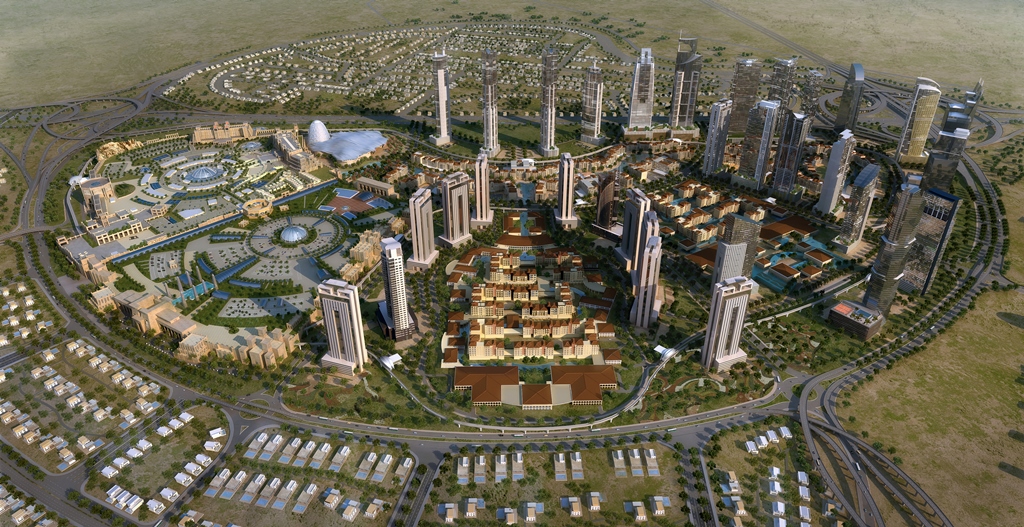
International Space Station, Space
Encyclopaedia Britannica/UIG / Getty Images
The International Space Station (ISS) circles the earth every 92 minutes. Created by a consortium of 15 nations and five space agencies, it has a currently scheduled construction cost that exceeds $60 billion. The eventual cost of the space station and its contemplated expansions could exceed $1 trillion, by which point it could become a habitat for up to 1 million off-planet occupants.
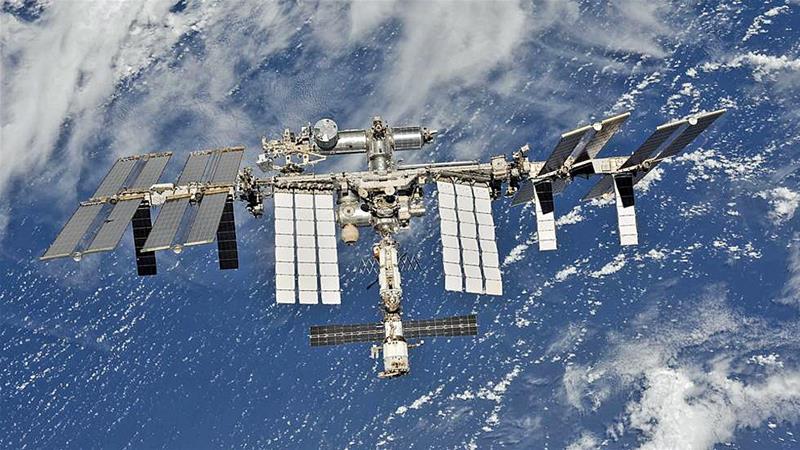
South-North Water Transfer Project, China
Christophe Boisvieux / Getty Images
The north of China is home to almost 50 percent of China's population but has only about 20 percent of the country's water resources. To remedy this imbalance, China has funded the construction of three huge canals, each more than 600 miles long and will carry water to the north from China's three largest rivers. The project has a 48-year construction schedule. When completed, it will supply 44.8 billion cubic meters of water each year.
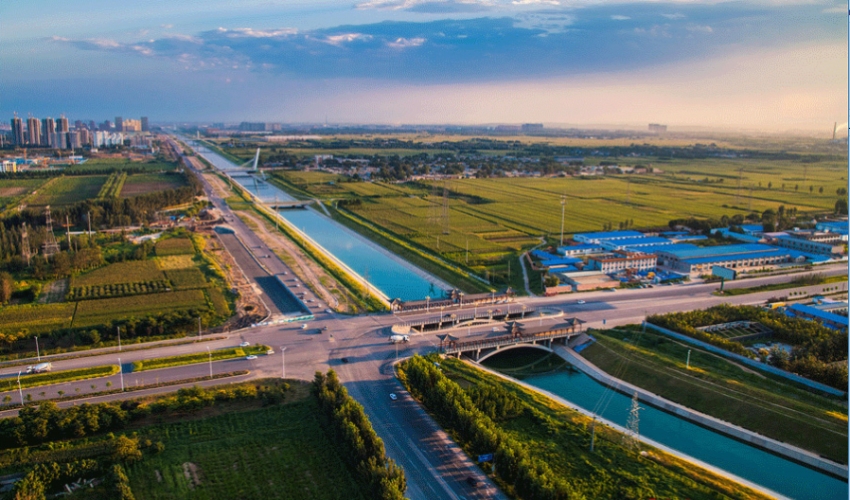
London Crossrail Project
Lionel Derimais / Getty Images
The world's first underground train system continues to grow, adding 26 miles of tunnel that will eventually connect 40 stations. The estimated cost of construction is $23 billion. The project is scheduled for completion in phases, with the first new line—the Elizabeth line—expected to go into service in 2019, followed by the remaining lines.

High-Speed Railway, California
Ren Morales / Getty Images
Work on California's high-speed train began in 2015 and is scheduled for completion in 2029. It will connect eight of the 10 largest cities in the state and reach from San Diego in the south to San Francisco in the north. The project will be completed in two phases: Phase 1 will connect Los Angeles to San Francisco; Phase 2 will extend connections to San Diego and Sacramento. The train will be 100-percent electric and will be powered entirely by renewable energy and capable of speeds up to 200 miles per hour.
Chuo Shinkansen, Japan
Barry Lewis / Getty Images
Officially called the Linear Chuo Shinkansen, Japan's newest high-speed rail line will take travelers from Tokyo to Nagoya—286 kilometers—in 40 minutes, at speeds up to 505 kilometers per hour. This leg of the high-speed journey is scheduled for completion by 2027. A later phase will extend the line to Osaka. About 86 percent of the Tokyo-Nagoya line will be underground, requiring extensive tunnel construction. This magnetic levitation (also known as "maglev") train is the fastest train in the world.

Beijing Airport, China
Christian Kober / Getty Images
Beijing International Airport will eventually surpass Dubai's Al Maktoum International Airport in cost, total square miles, and passenger and plane capacity. The airport's first phase was completed in time for the 2008 Olympiad. Further expansion is scheduled for completion by 2025. Terminal 1, designed by the architect Zaha Hadid, incorporates a number of sustainable design concepts in a futuristic building envelope.
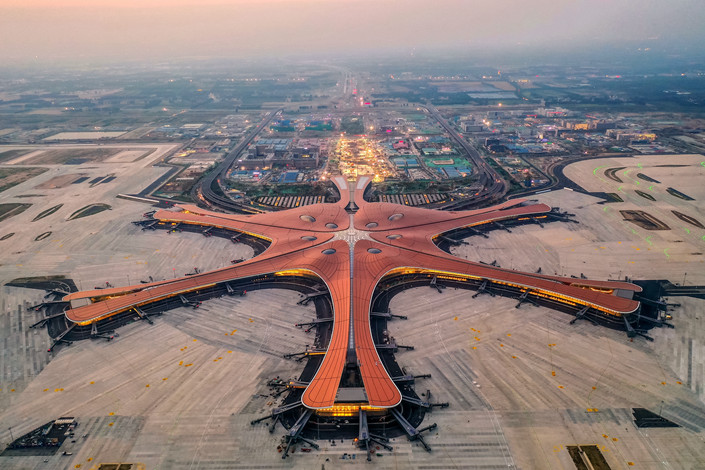
Great Man-Made River Project, Libya
Friedrich Schmidt / Getty Images
Libya has been working on the "Great Man-Made River" (GMR) project since 1985. It is the largest irrigation project in the world. When completed, it will irrigate more than 350,000 acres of arable land and will substantially increase available drinking water in most of Libya's urban centers. The water source for the project is the underground Nubian Sandstone Aquifer System. The project is scheduled for completion in 2030.





























